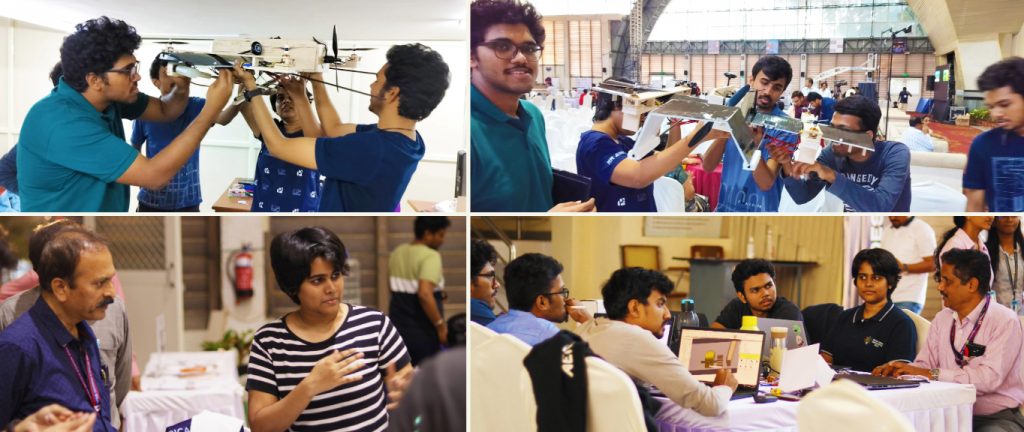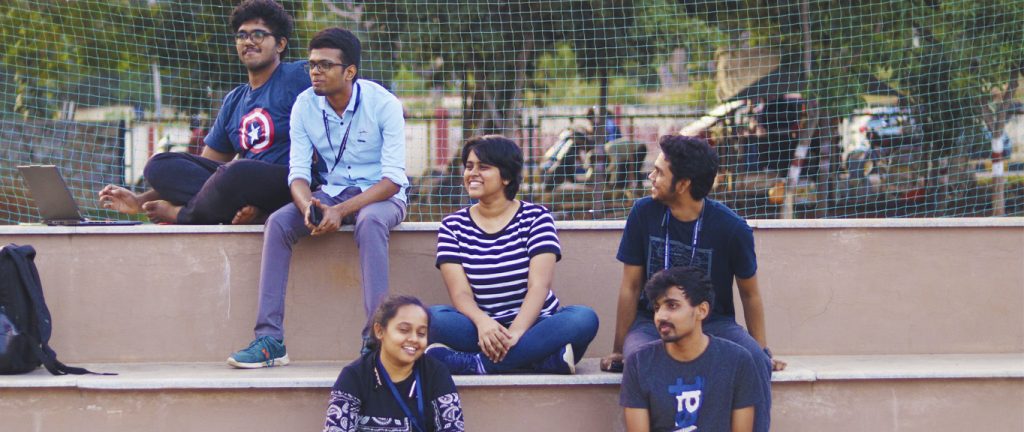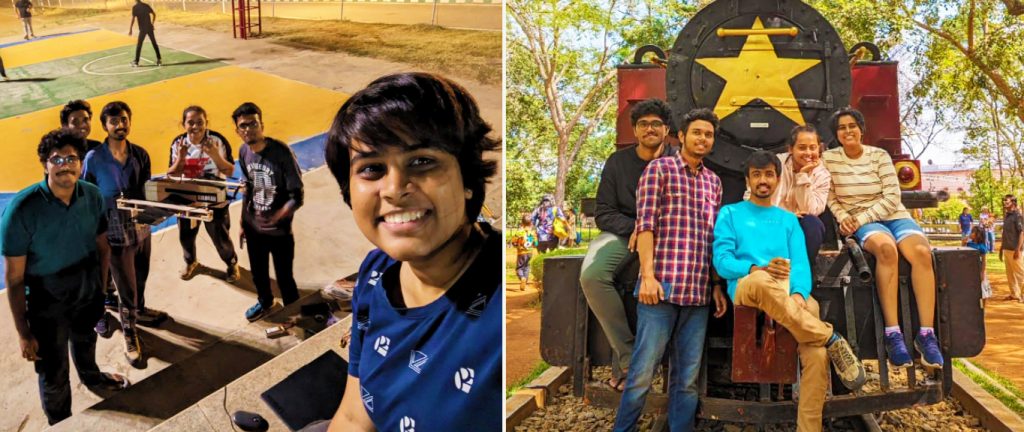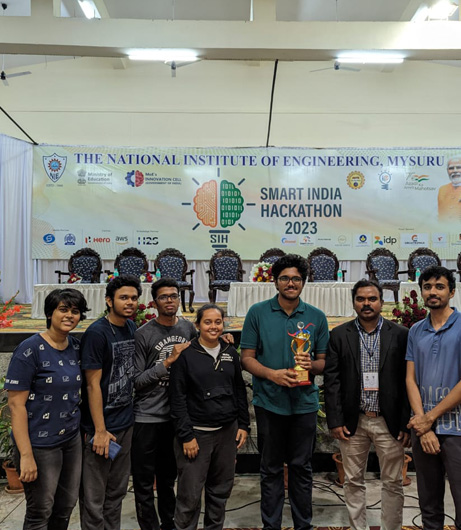Certainly. Our team, Avlokan, worked on the challenge presented by the Ministry of Defence, which focused on developing a ‘Drone-based Intelligent Magnetic Sensing System and Metallic Anomaly Detection.’ It was a complex task that required innovative solutions for national security through long-range maritime surveillance.
As we delve deep into the success story of Team Avlokan, the Dean ACR newsletter is delighted to speak with Yashodhan Tingne, a pivotal member of the team, who sheds light on the challenges the team faced, the collaborative efforts that fuelled their triumph, and the future endeavours that lie ahead.
Join us as we explore the journey of innovation and dedication that led Team Avlokan to emerge victorious at the forefront of technological excellence.
Our approach involved building a Quadplane VTOL aircraft equipped with a magnetic anomaly detection suite. This combination offered a robust and cost-effective method to address the specified problem statement. Our solution aimed at enhancing national security capabilities by providing efficient and precise long-range maritime surveillance.

One of our initial challenges was team composition. Several team members had to withdraw due to various reasons, posing a potential setback. However, our team leader, Captain Ameya Marakarkandy, remained resolute and successfully assembled a winning team that eventually triumphed.

Absolutely. Our fearless Captain, Ameya Marakarkandy, led the team with systematic work and quick decision-making. His decision-making prowess is unparalleled, with a quick and firm approach that instilled confidence in everyone to embrace his vision for success. Poised to take on the role of the upcoming Project Manager of the Student Satellite Program, he possesses a wealth of leadership qualities and a deep understanding of the optimal functioning of system and subsystem levels in hackathons. Leveraging his substantial experience with drones, he skilfully piloted our drone during flight operations.
Abhishek P. M., a fourth-year student from the Department of Aerospace Engineering, adeptly fulfilled multiple vital roles as a senior, mentor, and advisor within the team. Serving as the team lead for Team Rakshak, he showcased his expertise by skilfully crafting functional prototypes for RC planes, demonstrating comprehensive knowledge in Avionics, Structures, and Electronics. Renowned as the insightful seer of the team, Abhishek possessed a remarkable gift of foresight that played a pivotal role in the group’s overall success. His proficiency spanned both the electrical and mechanical aspects of the team’s work.
Anupsa Swain, a third-year student from the Department of Aerospace Engineering, brought a contagious enthusiasm and joy for fresh experiences to the team. Her meticulous approach ensured precision in every aspect of the team’s work. Leveraging her extensive background in communications and sensor technologies, Anupsa played a crucial role in overseeing the complete sensor subsystem. Her responsibilities ranged from meticulous testing to seamlessly integrating sensors and telemetry with authoritative command.
Arkadeep Saha, a sophomore from the Electrical Department, is a valuable team member always eager to contribute to every electrical aspect of the system. Collaborating with Anupsa, he took charge of conducting thorough testing for the integration of codes within the sensor subsystem. His involvement in the Student Satellite Program provided practical insights crucial to the success of the Hackathon.
Kanak Dudi, a sophomore from the Electrical Department, served as an invaluable team member, wearing multiple hats as our reliable support, motivator, and adept craftsman. Playing a pivotal role as the backbone of the Mechanical subsystem, she showcased her expertise from constructing the aircraft to breathing new life into it for flight. Kanak’s skills and experience demonstrated the essential qualities needed to excel in a hackathon of this nature.
Finally, I am Yashodhan Tingne, the team’s designer, and played a crucial role in the project. My primary focus was on developing deployment mechanisms for the prototype to efficiently deploy sensors away from the aircraft. By collaborating with the rest of the team, I contributed to the step-wise integration of all onboard systems, resulting in the creation of the final working model of the sensor-deploying Quadcopter.

Despite facing initial setbacks, our unity, skills, and coordination were instrumental in overcoming challenges. Captain Marakarkandy’s determination played a crucial role in rallying the team together. Working tirelessly for five days, sacrificing sleep and meals when necessary, we managed to craft and successfully fly our drone within the designated timeframe.
Moving forward, our team is committed to advancing our prototype. We plan to focus on testing and optimizing the design further to achieve greater reliability, efficiency, and market readiness. Our triumph at the Hackathon has inspired us to continue our work and strive for even greater heights in the field of innovative technology.
We would encourage anyone interested in hackathons to approach them with enthusiasm and dedication. Challenges will arise, but with the right team spirit and a clear goal, incredible feats can be achieved. The Smart India Hackathon provided us with a platform to showcase our skills, and we are excited to see what the future holds for our innovative endeavours.
To see a demonstration of Team Avlokan’s drone, click on the following video:
https://drive.google.com/file/d/1diaETBfvpZIrX2ao7I4E2MJzKeai0gCy/view?usp=sharing
Hearty Congratulations to Team Avlokan on their outstanding success at the Smart India Hackathon 2023, a testament to their exceptional talent and innovative prowess! Their ingenious solution to the Ministry of Defence’s challenge not only showcased technical brilliance but also exemplified the spirit of innovation and dedication ingrained in IIT Bombay’s legacy of shaping future leaders and innovators.
As the Institute continues to produce extraordinary students like the members of Team Avlokan, it solidifies its position as a cradle for cutting-edge talent, fostering a culture of excellence that propels technological advancements. IIT Bombay eagerly anticipates the future trajectory of Team Avlokan and cannot wait for more accolades to come their way!

